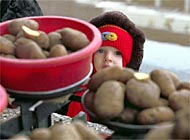Canton Vaud celebrates potatoes without borders

For three days, canton Vaud will be celebrating one of Switzerland's best-known dishes: rösti. The organisers of the "Röstiparc" hope to show that the humble potato can bridge Switzerland's language and cultural divide.
“Potatoes are to Switzerland what rice is to China,” says Daniel Pitton, a local potato producer and self-confessed rösti fanatic.
He and fellow potato growers in the Gros-de-Vaud region to the north of Lausanne have teamed up to promote their crop. The Röstiparc idea dates back to 1997, when regional producers organised an event called the “Röstibrücke”, or Rösti bridge.
There is much talk in Switzerland of the “röstigraben”, the real or imaginary divide which separates French- and German-speaking Switzerland. Rösti is normally associated with the German-speaking part of the country, but canton Vaud is one of the most important regions for growing the raw material. The idea of a “Rösti Bridge” seemed the logical way of straddling the divide.
“Three years ago we invited people from German-speaking Switzerland, and that was a great success,” says Danielle Richard, spokeswoman of the Röstiparc event. “We really wanted a celebration of federal togetherness.”
This year, the northeastern canton of St Gallen is the guest, mainly because it is at the opposite end of the country to Vaud, and possibly because the sausages it is rightly famous for go so well with rösti.
Instead of merely building a bridge as they did in 1997, the organisers have decided to do things on a much grander scale. A potato-sorting plant near the town of Bercher has been temporarily converted into a theme village – Röstiparc. Silos, crates, palettes and sacks of potatoes have been transformed into discos, concert halls, cinemas and even a chapel.
The scheme, and particularly the attempt to forge links with other parts of Switzerland, has caught the imagination. So much so that the Swiss president, Adolf Ogi, will be one of the 30,000 people sampling the regional specialities and entertainment on offer.
The unassuming brown tubers arrived in Switzerland from the Americas in the late 16th century. Today, they are one of the most important components of Swiss cuisine.
“There’s not just rösti. There’s potato salad, all the different potato pies, raclette, fries – the Swiss eat an enormous amount of fries. Potatoes are one of the staples of our diet. I would say we have a thousand everyday recipes for potatoes,” Danielle Richard told swissinfo.
Over the three days, visitors to Röstiparc will eat seven tonnes of rösti, three tonnes of fries, 15,000 sausages from St Gallen, as well as 500 kg of locally-produces sausages. No one is likely to go home hungry.
But there is a serious aim behind all the fun. The farmers of the Gros-de-Vaud are concerned that the Swiss are not eating as many potatoes as they once did. Eating habits are changing, and many Swiss associate rösti with the days of food shortages. It is also often considered to be downmarket.
“We need to promote the potato because it’s the kind of food you need to prepare before you can eat it,” Richard says.
“The trend nowadays is towards fast food, so people are no longer used to taking a potato, peeling it and chopping it and cooking it in different ways. People no longer choose different varieties. You can’t do the same with a Charlotte as you can with a Nicola or a Bintje. We really need people to get to know more about potatoes,” she adds.
Röstiparc is open until midnight on Sunday June 25. It can be found at the Becopdt cooperative plant near Bercher.
by Roy Probert

In compliance with the JTI standards
More: SWI swissinfo.ch certified by the Journalism Trust Initiative
You can find an overview of ongoing debates with our journalists here. Please join us!
If you want to start a conversation about a topic raised in this article or want to report factual errors, email us at english@swissinfo.ch.